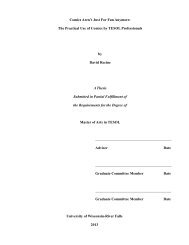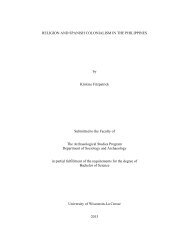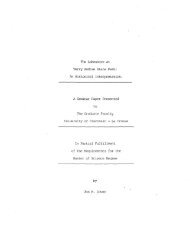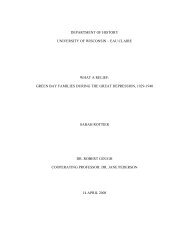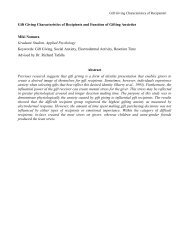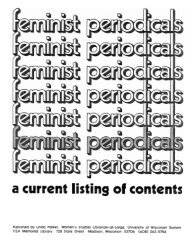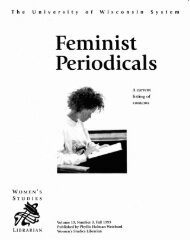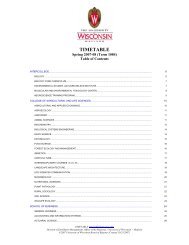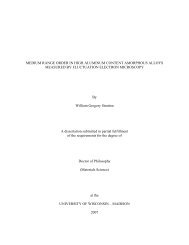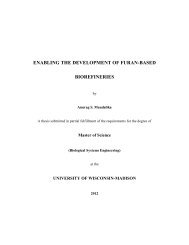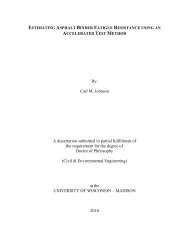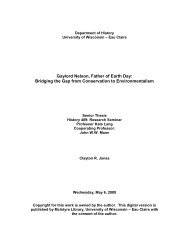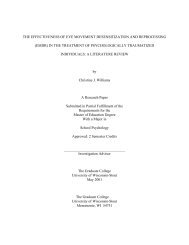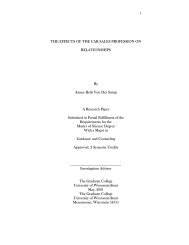1 CONFRONTS THE TEXTBOOK.. - MINDS@UW Home - University ...
1 CONFRONTS THE TEXTBOOK.. - MINDS@UW Home - University ...
1 CONFRONTS THE TEXTBOOK.. - MINDS@UW Home - University ...
You also want an ePaper? Increase the reach of your titles
YUMPU automatically turns print PDFs into web optimized ePapers that Google loves.
Pwe 14 Feminist Collediom v.16. n0.1. Fall 1994<br />
The three conceptual or organizational problems I've<br />
talked about so far can be thought of as three aspects of<br />
the same issue: How else can we tell women's history as<br />
history other than in maledefined categories? This is a<br />
problem Abby Kleinbaum wrestled with fifteen years ago<br />
in her essay "Women's History and the Western Civili-<br />
zation Survey," and one that hasn't been solved yet.6 Her<br />
conclusion then, that "women's history will destroy West-<br />
ern Civ," does not seem to have happened, though I sup-<br />
pose the changes in textbooks I've just mentioned are<br />
regarded by some as destruction.<br />
One solution appearing on the horizon -- or firmly<br />
here in some fields -- is to stop talking about women and<br />
start talking about gender. This has, at least in history,<br />
complicated the "women-and-the-family-are-not-the-<br />
same-thing" assertion, for now we must also say, ". . .and<br />
women and gender are not the same thing, either." But I<br />
am not quite ready to view gender as the answer to all<br />
our conceptual problems. For one thing, too much of the<br />
scholarship on "gender" still is about women. Here our<br />
traditionalist colleagues have more right to be confused<br />
than they do about distinctions between women and the<br />
family. And some of the new scholarship on "men as<br />
men" seems to suffer from a reverse of the conceptual<br />
problems in women's history; it tries to tell men's stories<br />
in femaledefined categories. Some of it, as well, re-<br />
quires great familiarity with the basic materials, making<br />
it dillicult for undergraduates to jump into debates mid-<br />
stream. It is also counched in language that is hard for<br />
many undergraduates to understand, but because much<br />
of the scholarly debate revolves around language itself,<br />
one cannot just simplify the terms.<br />
Many of these problems exist becaw the field of<br />
gender studies is so new, but I have even greater worries<br />
about what will happen when it matures. Will gender<br />
turn out to be the white knight who sweeps us off our feet<br />
with his brilliance, but leaves us always hanging on be-<br />
hind? To use a more modem military metaphor: Can the<br />
troops in the trenches of women's history, who are ex-<br />
ploring the relatively undocumented lives of women,<br />
avoid being rolled over by the Sherman tank of the much-<br />
betterdocumented lives of men?<br />
To turn from the metaphorical to the mundane:<br />
Along with problems shared by all textbook authors and<br />
all authors of women's history texts, I also faced certain<br />
problems because of my field. In covering all of Europe,<br />
I found a wildly uneven amount of research and level of<br />
sophistication depending on the topic and geographic<br />
area. For example, there are now scores of book-length<br />
studies of women writers in early modern England, and<br />
hundreds of articles using different theoretical perspec-<br />
tives to talk about their work. But what about women<br />
writers in Poland or other parts of eastern Europe? I first<br />
thought the issue was my lack of language capabilities,<br />
but colleagues who know the field assured me it was not,<br />
that there simply was very little scholarship in any lan-<br />
guage.<br />
The problems I've talked about so far resulted from<br />
my being a historian of women, but there were other prob-<br />
lems due to my being a feminist historian. Several years<br />
ago at a Society for Medieval Feminist Scholarship<br />
roundtable on women, history, and literature, Barbara<br />
Newman succinctly pointed out a great danger facing<br />
feminist history -- the temptation to make unreflective<br />
ethical judgments about the past, or, as she put it, the<br />
temptation to idealize, pity, orblame? I discovered while<br />
working on this text just how powerful these temptations<br />
are. Particularly when one has a page limit, such urges<br />
can become sins of omission as well as commission:<br />
Which writers do I mention by name? Which do I quote?<br />
Which religious groups get extensive coverage? The<br />
trickiest chapter was one I eventually titled "Women and<br />
the Creation of Culture," for the number of studies of<br />
women writers on this period far outweighs the number<br />
of studies of any other group of women, including queens.<br />
Along with temptation, being a feminist historian<br />
also brought severe attacks of doubt. Not only was there<br />
the standard academic doubt whether I would ever finish,<br />
but also doubt about whether I should be writing this<br />
book at all. Like my problems, these doubts ranged over<br />
several levels. Should I still be writing history? Our feminism<br />
has led us to question all claims of objectivity, making<br />
the statements of Hayden White and others about the<br />
similarity between historians and novelists quite seducti~e.~<br />
We envy literary critics who analyze texts, wishing<br />
that our sources were more uniform and that we could<br />
develop more far-reaching theories based on those



